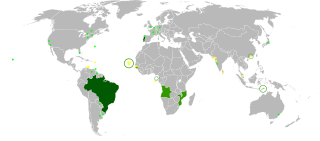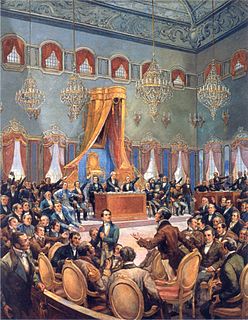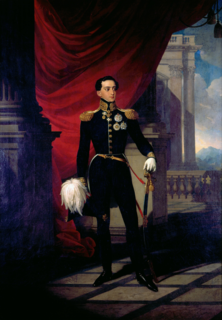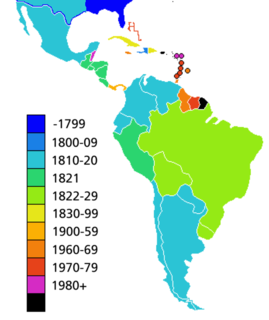Vintists Vintistas | |
|---|---|
| Founded | 24 August 1820 |
| Dissolved | 27 April 1823 |
| Succeeded by | Septemberist Party |
| Headquarters | Lisbon |
| Ideology | Royalism Constitutionalism Liberalism |
| Political position | Left |
Vintism (Portuguese : Vintismo, from vinte, "twenty", as in eighteen-twenty) is a term used to refer to the political movement that dominated Portugal between 1820 and 1823, characterised by the radicalism of liberal ideas and the preponderance of the Constituent Cortes. It gave birth to the Portuguese Constitution of 1822.

Portuguese is a Western Romance language originating in the Iberian Peninsula. It is the sole official language of Portugal, Brazil, Cape Verde, Guinea-Bissau, Mozambique, Angola and São Tomé and Príncipe. It also has co-official language status in East Timor, Equatorial Guinea and Macau in China. As the result of expansion during colonial times, a cultural presence of Portuguese and Portuguese creole speakers are also found in Goa, Daman and Diu in India; in Batticaloa on the east coast of Sri Lanka; in the Indonesian island of Flores; in the Malacca state of Malaysia; and the ABC islands in the Caribbean where Papiamento is spoken, while Cape Verdean Creole is the most widely spoken Portuguese-based Creole. A Portuguese-speaking person or nation is referred to as "Lusophone" (Lusófono).

Portugal, officially the Portuguese Republic, is a country located mostly on the Iberian Peninsula in southwestern Europe. It is the westernmost sovereign state of mainland Europe, being bordered to the west and south by the Atlantic Ocean and to the north and east by Spain. Its territory also includes the Atlantic archipelagos of the Azores and Madeira, both autonomous regions with their own regional governments.
Liberalism is a political and moral philosophy based on liberty, consent of the governed, and equality before the law. Liberals espouse a wide array of views depending on their understanding of these principles, but they generally support limited government, individual rights, capitalism, democracy, secularism, gender equality, racial equality, internationalism, freedom of speech, freedom of the press and freedom of religion. Yellow is the political colour most commonly associated with liberalism.
The Vintist political stances were advanced for their time and mobilized the liberal left for most of the rest of the 19th century. They demanded the end of absolute monarchy and the return of King John VI from Brazil, from where he had been ruling the country since Napoleonic forces had invaded Lisbon in 1807; [1] they appealed to the King to work together with the social forces represented in Parliament.
Absolute monarchy is a form of monarchy in which the monarch holds supreme autocratic authority, basically not being restricted by written laws, legislature, or customs. These are often hereditary monarchies. In contrast, in constitutional monarchies, the head of state's authority derives from and is legally bounded or restricted by a constitution or legislature.

John VI, nicknamed "the Clement", was King of the United Kingdom of Portugal, Brazil and the Algarves from 1816 to 1825. Although the United Kingdom over which he ruled ceased to exist de facto beginning in 1822, he remained its monarch de jure between 1822 and 1825. After the recognition of the independence of Brazil under the Treaty of Rio de Janeiro of 1825, he continued as King of Portugal until his death in 1826. Under the same treaty, he also became titular Emperor of Brazil for life, while his son, Pedro I of Brazil, was both de facto and de jure the monarch of the newly-independent country.

The transfer of the Portuguese Court to Brazil occurred with the strategic retreat of Queen Maria I of Portugal, Prince Regent John, also referred to as Dom João or Dom João VI, and the Braganza royal family and its court of nearly 15,000 people from Lisbon on November 29, 1807. The Braganza royal family departed for the Portuguese colony of Brazil just days before Napoleonic forces invaded Lisbon on December 1. The Portuguese crown remained in Brazil from 1808 until the Liberal Revolution of 1820 led to the return of John VI of Portugal on April 26, 1821. For thirteen years, Rio de Janeiro, Brazil, functioned as the capital of the Kingdom of Portugal in what some historians call a "metropolitan reversal", i.e., a colony exercising governance over the entirety of the empire. The period in which the court was located in Rio brought significant changes to the city and its residents, and can be interpreted through several perspectives. It had profound impacts on Brazilian society, economics, infrastructure, and politics. The transfer of the king and the royal court "represented the first step toward Brazilian independence, since the king immediately opened the ports of Brazil to foreign shipping and turned the colonial capital into the seat of government."
The Vintist movement started after the revolution of 24 August 1820 that swiftly replaced the protectorate of William Beresford with a Provisional Junta and Constituent Assembly [2] [3] composed of diplomatic functionaries, merchants, agrarian burghers, and university-educated representatives who were usually lawyers. Vintism ended with the Vilafrancada on 27 May 1823, a military uprising led by Prince Miguel that led to the abolishment of the 1822 Constitution and the reestablishment of absolute monarchy.

The Liberal Revolution of 1820 was a Portuguese political revolution that erupted in 1820. It began with a military insurrection in the city of Porto, in northern Portugal, that quickly and peacefully spread to the rest of the country. The Revolution resulted in the return in 1821 of the Portuguese Court to Portugal from Brazil, where it had fled during the Peninsular War, and initiated a constitutional period in which the 1822 Constitution was ratified and implemented. The movement's liberal ideas had an important influence on Portuguese society and political organization in the nineteenth century.

General William Carr Beresford, 1st Viscount Beresford, 1st Marquis of Campo Maior, was an Anglo-Irish soldier and politician. A general in the British Army and a Marshal in the Portuguese Army, he fought alongside The Duke of Wellington in the Peninsular War and held the office of Master-General of the Ordnance in 1828 in Wellington's first ministry.

The Constituent Cortes of 1820, formal title The General and Extraordinary Cortes of the Portuguese Nation, also frequently known as the Sovereign Congress or the Cortes Constituintes Vintistas, was the first modern Portuguese parliament. Created after the Liberal Revolution of 1820 to prepare a constitution for Portugal and its overseas territories, it used a different system from the traditional General Cortes for choosing representatives, and the three traditional feudal estates no longer sat separately. The Cortes sat between January 24, 1821 and November 4, 1822 at the Palácio das Necessidades in Lisbon. The work of the Constitutional Cortes culminated in the approval of the Portuguese Constitution of 1822.











